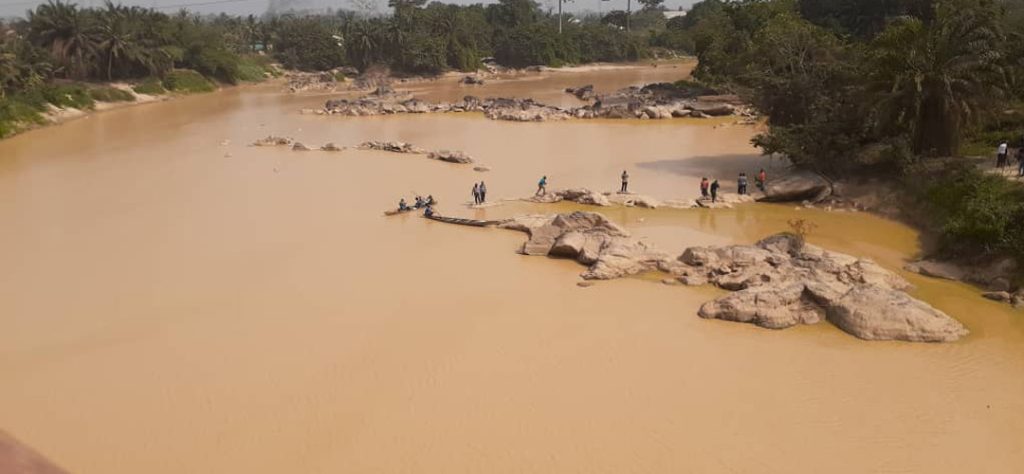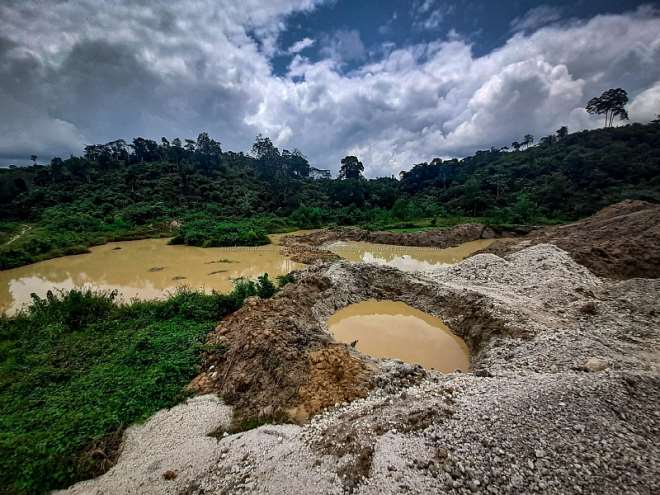Illegal small-scale gold mining, commonly known as “galamsey,” has become a severe public health and environmental crisis in regions like Ghana. This perilous activity devastates the environment and poses profound risks to the health and livelihoods of those involved. The repercussions are far-reaching, affecting vulnerable populations and undermining community well-being.
While Galamsey may provide short-term economic benefits, it also poses several health and environmental stability problems. The destruction of agricultural fields and the poisoning of water sources are just the start. These ecological effects cause food instability and an increased reliance on harmful processed foods, aggravating health problems and jeopardising the quality of life in impacted populations. As we investigate the numerous health dangers and socioeconomic repercussions of galamsey, it is important to recognise the urgent need for intervention and long-term solutions.
Direct Health Risks from Galamsey Activities

- Exposure to Toxic Substances: Hazardous chemicals used in galamsey operations include mercury, cyanide, arsenic, and lead. These chemicals can contaminate local water supplies and soil, posing severe health risks. Mercury exposure, for example, can induce neurological diseases, cognitive deficiencies, and developmental delays in children, who are especially sensitive because of their underdeveloped immune systems.
- Respiratory and Kidney Problems: Poorly ventilated mining conditions expose workers to dust and toxic fumes, contributing to respiratory disorders such as chronic obstructive pulmonary disease (COPD) and other lung-related illnesses. Prolonged exposure to heavy metals can also lead to significant kidney damage.
- Accidents and Injuries: Due to the informal nature of galamsey, safety laws are sometimes overlooked. Miners are at greater risk of accidents due to unstable ground conditions, malfunctioning equipment, and a lack of protective clothing. Falls, cave-ins, and equipment-related accidents are all common causes of injury that can result in long-term disability or death.
- Waterborne Diseases: Mining activities can contaminate water bodies, raising the danger of waterborne infections in communities that rely on these sources of drinking water. The presence of heavy metals and microorganisms in contaminated water can cause gastrointestinal illnesses and other major health issues.
- Mental Health Impacts: The stress and volatility connected with galamsey can cause substantial mental health problems for miners and their families. Anxiety, despair, and substance misuse are all exacerbated by harsh working circumstances and economic uncertainty. Church advocacy initiatives in Ghana have highlighted the critical need for psychological help and guidance.
- Nutritional Deficiencies: Land degradation caused by galamsey affects local food production, resulting in shortages of critical crops. This worsens malnutrition, especially among vulnerable groups like children and pregnant women, worsening their general health and development.
- Impact on Child Development: Children who live near galamsey sites are at risk of developmental problems owing to environmental contamination. Heavy metal exposure has been associated with delayed language acquisition, poor speech development, and congenital abnormalities, all of which have a substantial impact on people’s quality of life.
Socio-Economic Consequences of Galamsey

- Livelihood Challenges: Despite the health dangers and income volatility connected with galamsey, many people, particularly women, use it to survive. This reliance on the informal sector feeds a cycle of poverty and bad health, hurting overall community well-being.
- Increase in Crime Rates: The illegal nature of galamsey activities contributes to increased crime rates within affected areas. Reports indicate unreported murders linked to conflicts between miners over resources or money, including attacks on both local and foreign miners. This rise in violence creates an atmosphere of fear and insecurity within communities, undermining social cohesion and trust among residents.
- Economic Instability: While some may argue that galamsey provides economic opportunities for local communities, its unsustainable nature often leads to long-term economic instability. The destruction of agricultural land affects food security and livelihoods for many families dependent on farming.
The Devastating Toll of Galamsey on Ghana’s Ecosystems

- Deforestation and Soil Erosion: Extensive pits for mining waste further degrade the land in regions like Tarkwa, disrupting ecological functions like biodiversity maintenance and carbon sequestration. In order to access mineral deposits, galamsey operations require extensive removal of vegetation cover, which causes deforestation and soil erosion. The loss of topsoil renders the land infertile and unproductive for agriculture.
- Noise and Air Pollution: Heavy machinery and explosions during mining activities contribute significantly to noise pollution. This noise might cause hearing damage among workers and disturb local wildlife. Furthermore, the discharge of chemical gasses and dust particles degrades air quality, with pollution linked to respiratory problems in adjacent areas.
- While galamsey offers immediate economic benefits, its profound and long-lasting health and environmental consequences underscore the need for urgent intervention. Sustainable practices and comprehensive policies are crucial to mitigating these impacts and ensuring a healthier, more secure future for affected communities.
Call to Action
We urge policymakers, community leaders, and individuals to unite in tackling the galamsey crisis. Support initiatives that promote sustainable mining practices, advocate for stronger regulations, and invest in community health and environmental conservation. To effectively address the health impacts of galamsey, comprehensive measures are essential. These should integrate health and livelihood needs, focusing on improving healthcare access, enforcing environmental regulations, and fostering alternative livelihoods to mitigate the adverse effects of illegal mining. Together, we can make a significant difference and secure a healthier future.
We are committed to providing accurate, actionable, and easily understood content that helps you make informed decisions for yourself and your loved ones
Useful Links
Subscribe Now
Want to live healthier, feel better, and stay informed? Join our community and get easy-to-follow health tips, wellness insights, and natural remedies delivered straight to your inbox.
Subscribe Now! Get updates inbox
Don’t miss our future updates! Get Subscribed Today!
You have subscribed successfully!
Some error occured
Please fill all the required * fields.
©2025. Lenstapes Med.. All Rights Reserved.

